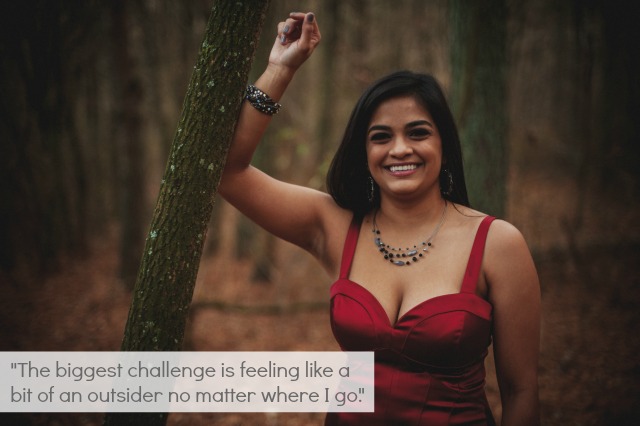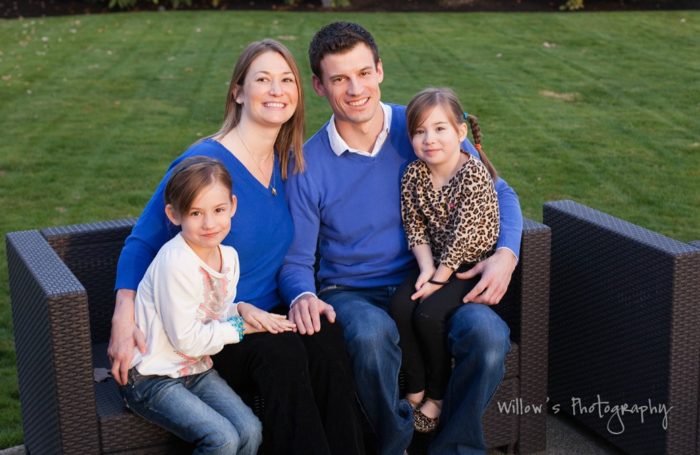Tell us a bit about yourself!
I grew up in North Alabama and now live in Atlanta. I’m 26-years-old and work as a marketing manager. I enjoy social media and plan to launch my photography business early next year. In my free time, I love going to rock concerts, traveling, and spending quality time with my fiance and our two dogs.
Where is your family from? When (and why) did they immigrate to America?
My family is from India and immigrated to America in the 1970s. My (maternal) grandfather came to the United States on a student visa. His grandmother sold what jewelry she had to help fund his trip. Eventually he was able to gain employment and bring his family over including my mother and her four siblings. My parents arrived in Queens, NY as newlyweds. My father finished his medical education/training while my mom worked as an accountant.
What was it like for them to adjust to life in America?
They definitely experienced some culture shock. My mother had visited the United States only once before moving here. In school they were taught British English, while this helped serve as a foundation, they still had to learn to speak conversational American English. As Hindus, my parents are vegetarian and prefer to eat Indian (specifically Gujarati) food. At the time it was difficult to find Indian groceries. Of course, New York’s Indian food and grocery options have changed quite a bit since!
Growing up, how did your family feel about cultural identity?
Our culture identities and lifestyles have evolved over time. It’s important to my parents that we maintain our Indian identities, but for me it’s also about integrating this with my American identity. My parents regularly speak Gujarati at home and I respond back in English. Growing up we had a local Indian organization that would hold celebrations for many of the Indian holidays like Holi or Garba. Events like these allowed my parents to meet other local Indian families.
We didn’t participate in most American holidays, like Easter or Thanksgiving. When we were children, my parents would decorate and give us Christmas presents, but we didn’t celebrate the religious aspect or hold a big dinner. They were open to us experiencing things like Thanksgiving with our American friends and their families, though.
How did you navigate being both Indian and American? Was it ever difficult?
It was much more difficult for me growing up then it is now as an adult. I attribute most of this to us living in the South. The town I grew up in was mostly populated by white, southern Baptists. I was a bit too young to understand racism but my family and I definitely felt the effects, some of which I only realized later as a teen. I remember being told as a young child that I was going to hell for not being Christian by both children and adults alike. To paint a fair picture, the majority of people were friendly enough and my childhood was generally a happy one.
When you were a teenager and beginning to date and become more independent, were there ever cultural struggles?
Oh jeez, I think this was probably one of the most difficult aspects of being a first-generation American. In India, the norm is for parents to find a suitable mate for their daughter to marry. My parents may have met a few times before their wedding, but there was no typical dating. I was not allowed to date, so my high school boyfriend was just a friend that was a boy. I gained a lot of independence through extra-curriculars. Now that I’m older I realize a lot of the household rules were strict because my parents and I grew up in different cultures.
Has your cultural identity affected other areas of your life?
I don’t feel that my cultural identity had impacted my academic or professional life too much. I’m still early in my career, but I think most people have a positive stereotype of Indians as smart, educated, and hardworking. I’m proud to say I fit that description. On the romance side, early on it was expected for my sisters and I to find Indian husbands but overtime my parents’ feelings have shifted. My mom has since told me that she thinks an American boy would be better suited for me because we’d have a similar culture. She was right… I’m marrying a white Georgia-native.
If you have children of your own, how much emphasis will you put on cultural identity?
I don’t have or plan on having children, but if I did I would want to share things from their Indian heritage. We could read Indian fairy tales, watch Bollywood movies, and attend Holi festivals. Unfortunately, I don’t speak Gujarati or Hindi but I would be willing to learn if the kids were interested as well.
What are the best parts of being a first generation American? The biggest challenges?
I have to say that I prefer the American lifestyle. I feel very fortunate to have all the advantages, securities, and opportunities of living in a first-world country.
The biggest challenge is feeling like a bit of an outsider no matter where I go. Because my cultural identity is obvious in my physical appearance, people often make incorrect assumptions about me. They don’t take the time to know the rock concert going, tattoo having, adventure-seeking person behind the brown skin. On the flip side, when I visited India they all viewed me as American. My accent, clothes, and general demeanor gave it away. I’ve found both Americans and Indians view me as a foreigner.
What advice would you give to any first generation Americans who are struggling with their identity?
It gets better over time. Remember that you are individual and your identity is unique to you. Embrace the things you enjoy about the different cultural influences in your life. If you’re feeling disconnected, read a book, watch a movie, or cook a dish from your heritage. Attend a local cultural festival or find a meetup of similar people. We live in a great time where you don’t have to fly to India to get a taste of Indian life.
Thanks so much for sharing, Sonal! Are any of you guys first-generation Americans? Do you have any questions for Sonal?













I'm a first generation American, too, but my parents are from the UK so the cultural difference is much smaller. The biggest issue I've encountered was from learning British English from my parents rather than American English as a child. There are actually quite a few things I've stopped saying because it made me uncomfortable when people commented on it, like a friend's mother who whenever I said the phone line was engaged instead of busy would ask me who is was engaged to.
Now I live in Germany and as an EU citizen I don't need a visa, but I have to enter and leave the country on my UK passport rather than my American one. It's a very strange feeling to be presenting myself as being from a country I've never even lived in, almost like I'm a fraud.
This is very much the story of my life, if you switch Indian for Chinese, and American for Australian. Being a third culture kid can be really difficult, but the key is to not lose sight of your heritage, while embracing all that is new!
Wow, hats off to the grandfather who took that bold step way back in 1970.
I met a lady (who is a grandmother now) She came from Ireland on her own, married an American and settled down in Colorado. Listening to her tale was really interesting.
I was born in Serbia, raised in America by a Serbian mom, and an American dad. I feel a little awkward in both respects – there are so many cultural norms I wish were integrated into American culture that sometimes make me feel like I don't belong, whereas America has so many opportunities that Serbia might not. It's weird being in the in-between, but it's also nice to have fragments of myself belong in different cultures, it's definitely taught me a lot.
Great interview! I also grew up in North Alabama! How did your family end up there?
@Anonymous …we ended up there for my dad's job.
I stumbled across this article which discusses this topic further, specifically for Asian-Americans. http://www.connie-zhou.com/asian-american-awakening/
[ I stayed up all night praying, so my English is a bit off ]
My story : I am a first generation American, only after 36 years I may say with pride :” God Bless American.” National Identities that what makes us beautiful, the UN and the EU make a mockery of our Civilization, Faith Systems … etc. So, if I have to travel, I will need multiple visas, special permission to visit places like Saudi Arabia, Mount Athos, Tibet [ unfortunately I will need Chinese permission , nor D. Lama ], Vatican City … Each ethnic group need to learn from Jews, how they kept their national and religious identities through years of dispersement … Every body needs to live in peace, care for widows, children, and elderly,
and not to wage war on such of other ethnic groups …. every one need prosperity … what if Mexico began to fire missiles on the US side, our troops would be in Mexico City in seconds … HAMAS keeps other Palestinians in Gaza as hostages, keeps them to be killed, Israel operates in self defense, as the US would if missiles flew on Dallas from the Mexican side …
Immigration into the US was what? Did Puritans had to go through a border check, did Custard General came to deliver a bouquet of roses, did Nixon lied, as he delivered speech about something, B 52 unlashed HELL onto Cambodia, thus making a way for Kmerush to take over, and kill millions of innocent citizens … I want to ask a question:”DO YOU REMEMBER MUNICH 1972? Or, DO YOU REMEMBER 60 MILLIONS OF SOVIET PEOPLE THAT STALIN KILLED BETWEEN 1927 AND 1953. Or, do you REMEMBER IN YOUR NOSTRILS SMELL OF BURNING HUMAN FLESH IN HITLER’S GERMAN CONCENTRATION CAMPS? DO YOU HEAR THE CRY OF WOMAN BEING RAPED BY ISIS, TALIBAN, SEXUALLY CUT OPEN …. if you say YES, then you may do something GOOD in your life, but if you just want to be a 1%, then go frocking into HELL, ………… [ I stayed up all night praying, so my English is a bit off ]
PS Germany and France never repaid all moneys that they owned for MARSHAL PLAN, after WWII, Germany who started both World Wars, never paid back on the War ‘Charges’ imposed on Germany by the Western World, Germany ROYALLY Screw up Russia, by making sure that Lenin’s Gang would make to Russia safely, The UK Parliament and British Royal Family has blood of Romanov’s children on their hands, because that frocking Parliament did not allow family of Czar Nickolas II to go into exile,before Bolsheviks came to the power … the World is sort of like Purgatory … it is a cruel place … I guess, what is in your heart will prevail, there you end up, either in Hell of Heaven … God Bless America, and we are NOT CANADA, because my stance in frucken CANADA would be considered a HATE CRIME ….